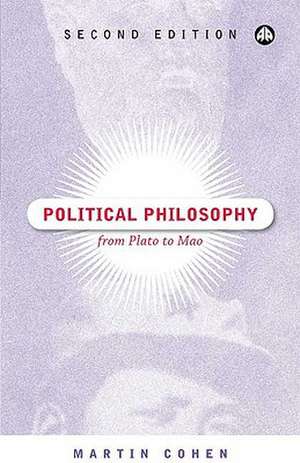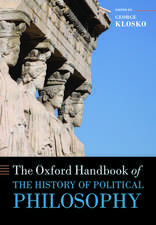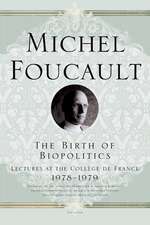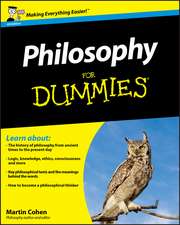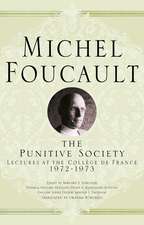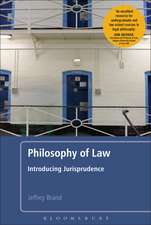Political Philosophy: From Plato to Mao
Autor Martin Cohenen Limba Engleză Paperback – 19 sep 2008
Cohen moves chronologically through the development of political philosophy. He presents key texts in their own terms, before offering short, precise analyses of their strengths, weaknesses and influence. The book finishes with a discussion of modern liberalism and conservatism.
Providing both a broad overview and precise summaries of key ideas, this is an invaluable guide for all students of political thought.
Preț: 236.70 lei
Nou
Puncte Express: 355
Preț estimativ în valută:
45.30€ • 49.19$ • 38.05£
45.30€ • 49.19$ • 38.05£
Carte tipărită la comandă
Livrare economică 23 aprilie-07 mai
Preluare comenzi: 021 569.72.76
Specificații
ISBN-13: 9780745324708
ISBN-10: 0745324703
Pagini: 350
Dimensiuni: 135 x 215 x 20 mm
Greutate: 0.43 kg
Ediția:2nd Edition
Editura: PLUTO PRESS
Colecția Pluto Press
ISBN-10: 0745324703
Pagini: 350
Dimensiuni: 135 x 215 x 20 mm
Greutate: 0.43 kg
Ediția:2nd Edition
Editura: PLUTO PRESS
Colecția Pluto Press
Notă biografică
Martin Cohen is Research Fellow at University College of St. Mark and St. John, Plymouth, and author of 101 Philosophy Problems (Routledge, 1999), and editor of The Philosopher and author of the bestselling 101 Philosophy Problems.
Cuprins
Note to the Second Edition
Introduction
Context: The Story of Human Society
1: Plato’s Vegetarian Republic
Key Text: Republic
2. Confucius’s Polite Society
Key Text: Analects
3: Aristotle and the Hierarchy of Nature
Key Text: Politics
4: Mohammed’s Message of Doom
Key Text: Koran
5: Machiavelli’s Psychopathic State
Key text: Discourses
6: Hobbes’ Wicked World
Key Text: Leviathan
7: Locke’s Feudal Freedom
Key Text: Essay Concerning the True, Original Extent and End of Civil Government
8: Rousseau’s Ode to Liberty
Key Text: Discourse on Inequality
9: The Founding Fathers’ Constitutional Recipe
Key Texts: The U.S. Constitution and Declaration of Independence
10: Mr Smith’s Excellent Inquiry into Money
Key Text: An Inquiry into the Nature and Causes of the Wealth of Nations
11: Marx’s Messianic Materialism
Key Text: The Communist Manifesto
12. Mill’s Optimistic Liberalism
Key text: The Principles of Political Economy]
13: Durkheim’s Strange Science
Key text: Social Rituals and Sacred Objects
14: The Philosophical Dance with Fascism
Key Text: The Doctrines and Institutions of Fascism, by Benito Mussolini
15. Hitler’s Doctrine of Hate
Key text: Mein Kampf
16: Mao’s Little Red Book
Key text: The Red Book
Epilogue: Karl Popper and the search for the End of History
References and Sources for Further Reading
Index
Introduction
Context: The Story of Human Society
1: Plato’s Vegetarian Republic
Key Text: Republic
2. Confucius’s Polite Society
Key Text: Analects
3: Aristotle and the Hierarchy of Nature
Key Text: Politics
4: Mohammed’s Message of Doom
Key Text: Koran
5: Machiavelli’s Psychopathic State
Key text: Discourses
6: Hobbes’ Wicked World
Key Text: Leviathan
7: Locke’s Feudal Freedom
Key Text: Essay Concerning the True, Original Extent and End of Civil Government
8: Rousseau’s Ode to Liberty
Key Text: Discourse on Inequality
9: The Founding Fathers’ Constitutional Recipe
Key Texts: The U.S. Constitution and Declaration of Independence
10: Mr Smith’s Excellent Inquiry into Money
Key Text: An Inquiry into the Nature and Causes of the Wealth of Nations
11: Marx’s Messianic Materialism
Key Text: The Communist Manifesto
12. Mill’s Optimistic Liberalism
Key text: The Principles of Political Economy]
13: Durkheim’s Strange Science
Key text: Social Rituals and Sacred Objects
14: The Philosophical Dance with Fascism
Key Text: The Doctrines and Institutions of Fascism, by Benito Mussolini
15. Hitler’s Doctrine of Hate
Key text: Mein Kampf
16: Mao’s Little Red Book
Key text: The Red Book
Epilogue: Karl Popper and the search for the End of History
References and Sources for Further Reading
Index
